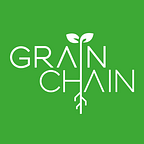How Blockchain Technology Can Bolster Global Supply Chains in Times of Crisis
- Supply chain disruptions (such as the COVID-19 pandemic and recent global conflicts) have become a critical concern for agribusiness worldwide, leading to a need for innovative solutions to enhance resilience and transparency.
- GrainChain is demonstrating how blockchain technology has emerged as a tool to address these challenges, offering the potential to transform supply chain management.
- Smart contracts powered by blockchain technology can help lenders and producers by allowing them to adjust the disbursement of financing to adapt to volatile market conditions.
The impact of GrainChain’s innovative solutions come squarely into focus when the world is facing supply chain disruptions from multiple global crises. The uncertainty of wars and pandemics drives inflation and creates price volatility as the cost of agricultural inputs as well as commodity sale prices vary wildly for producers. These crises are happening at a time where we are already approaching a global food shortage.
The solution to these challenges is to bring transparency, efficiency and reliability to the data flowing through each stage of the supply chain. Blockchain technology, when applied the right way, can help producers, lenders, and other agricultural supply chain participants to overcome these hurdles.
GrainChain sees the impact on producers, for example, who typically secure loans on a yearly basis only to have the cost of doing business shift dramatically throughout the season. Blockchain technology helps enable smart contracts that can give greater control and flexibility to lenders and producers to mitigate risks and market volatility. Through our solution, lenders can adjust to market conditions, increasing loan amounts because they have visibility into how the value of a contract has changed and increased (and that the farmer will be able to repay those loans).
GrainChain’s solutions level the playing field for producers, buyers, lenders, storage operators and all other participants.
The Impact of Global Crises on Supply Chains
- Pandemic Disruptions: The COVID-19 pandemic unveiled vulnerabilities in global supply chains, with lockdowns, travel restrictions, and labor shortages impacting manufacturing, shipping, and logistics. Producers and silo operators that relied on manual labor, paper records and already slow processes for transactions saw their operations grind to a halt.
- War in Ukraine: Ukraine is a top grain exporter, and the ongoing war with Russia has devastated production and caused a spike in global food prices. Russia is also the world’s leading exporter of fertilizer, driving up prices for critical ag inputs.
- Israel-Hamas Conflict: The current conflict in Israel has significantly impacted the country’s farmers, as the rich farmland around Gaza (which usually provides most of Israel’s produce) has been shut down by the military. Israel must now import most of their produce, driving up prices there and adding to global inflation as the price of commodities rises.
Blockchain Technology as a Solution
Blockchain technology offers several key features that make it a potent solution for improving the resilience of supply chains during crises:
- Transparency and Traceability: Blockchain provides an immutable ledger where every transaction or event is recorded. This transparency allows supply chain stakeholders to trace the journey of products from source to destination, ensuring authenticity and quality. Through GrainChain, financial institutions who provide loans to producers use their visibility into the supply chain to lower their risk and maintain control over disbursement, allowing them to offer more and better financing options and overcome the challenges of global crises.
- Smart Contracts: Smart contracts are agreements between parties that self-execute when the agreed upon terms have been met. GrainChain’s patented solution feeds commodity data from sensors and IoT devices into the blockchain, allowing the platform to verify the terms have been met and trigger execution of the contract. This means banks and lien holders get paid first, producers are paid more quickly and easily than ever, and buyers receive immediate tradable title to the commodity.
- Decentralization: The decentralized nature of blockchain means that there’s no single point of failure. Information is distributed across a network of nodes, making it more resilient to disruptions caused by conflicts or natural disasters.
- Real-time Data: With blockchain, all parties in the supply chain have access to real-time data, which is essential during crises when quick decision-making can make a significant difference. This helps in identifying bottlenecks and making timely adjustments. GrainChain’s suite of products gather this data at each stage of the supply chain to help all participants make more informed decisions.
- Supply Chain Financing: Blockchain can also facilitate supply chain financing by providing a transparent and tamper-proof record of transactions. This can help companies secure funding when traditional financial institutions may be hesitant during crises. GrainChain helps facilitate financing and gives lenders control over how loan money is disbursed and repaid, such as releasing a partial payment when a producer meets a certain milestone, enabling lenders to offer more loans at better rates.
Conclusion
The global crises of the past few years have underscored the need for resilient and transparent supply chains. Blockchain technology offers a promising solution to address the challenges posed by these crises. By enhancing transparency, traceability, reliability and automation, it can help businesses adapt to disruptions, minimize risks, and continue to deliver agricultural commodities to market.
The visibility and control that GrainChain’s blockchain technology and smart contracts provide to lenders and producers give them the flexibility they need to adapt to crises that wreak havoc on the agricultural sector.
Learn more at grainchain.com.
